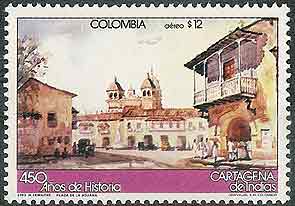 |
| During Easter Week a man sells posters of Pope Francis on Ave. Septima in Bogotá. |
With the Catholic Church's first-ever Jesuit Pope and first-ever Latin American Pope, I wondered about the history of the Jesuit Order, the Company of Jesus, in Latin America.
 |
| The Church of St. Peter Claver in Cartagena. |
Founded in 1540, the Jesuits, or the Company of Jesus, have built a reputation for humility, social activism and dedication to the poor. In those senses, Francis's story provides some contradictions. Jesuits, after all, are not supposed to seek positions of authority. And, while Francis does show a real humility and vocation for the poor, by my reading the Argentine Catholic Church and Francis (then Jorge Mario Bergoglio, the Provincial superior of the Society of Jesus) in particular, could have done much more to oppose and condemn the human rights violations of the Argentinean dictatorship. Instead, the church hierarchy kept publicly quiet, altho Francis says that he worked privately to protect victims.
 |
| A Colombian stamp honors Javeriana University's 250th anniversary. |
In contrast to their relatively enlightened work with native peoples, the Jesuits were also important buyers and employers of slaves from Africa.
I haven't found any Jesuit misiones in colonial Colombia, known roughly as La Nueva Granada (there were many in Brazil, Paraguay, Bolivia and Argentina), but the order did found many schools and haciendas in La Nueva Granada during the colonial era.
In 1767, apparently due to tensions caused by the Jesuits great economic power, as well as liberalizing and secularizing trends in Europe, the Jesuits were expelled from the territories of Spain and their properties auctioned off. Some 50 years later, after the Restoration brought back the old order, the Jesuits would be allowed to return, but they never regained their old power.
Today in Colombia the Jesuits run many educational institutions, the most best-known of them being the La Javeriana Universities in Bogotá and Cali. La Javeriana is the only private university I know of with any reputation for leftist activism. They also have several prominent high schools, including the Colegio San Bartolomé. The Jesuits also established the Bogotá-based Center for Investigation and Popular Education (CINEP), which studies poverty, armed conflict and environmental issues.
A bit surprisingly, given the Jesuits' vocation for the poor and independent thinking, none of the Colombian priests-turned-guerrillas have been Jesuits. Recently, however, two Jesuit priests at La Javeriana U. have been disciplined by the Jesuit hierarchy for violating church doctrine. One spoke out in favor of abortion and another questioned the virginity of Mary, the mother of Jesus.
Which brings up another contradiction in Pope Francis. Despite the Jesuit's reputation for progressivism and independent thinking, in Argentina Francis collaborated with Popes John Paul and Benedict to eliminate Liberation Theology ideas from the Argentine church. Liberation Theology, which urges believers to imitate Jesus's actions and values rather than his supposed holiness, was pioneered by Colombian priests.
By Mike Ceaser, of Bogotá Bike Tours




4 comments:
I actually wrote a research paper about this subject! In summary: Colombia's Jesuits are a pretty conservative bunch compared to the rest of LatAm, but they are still pretty much the most progressive wing of Colombia's Church.
The current director of the Jesuits, Pacho de Roux, is a very solid guy. They have done some great work in the Magdalena Medio.
Hi Elyssa - It's interesting that Colombia's Jesuits are more conservative than others in the region. Wonder why that is. Ironic that, despite that, they're still more progressive than the rest of the Colombian church.
Best,
Mike
Progressive / Regressive
Progressive / Regressive
Post a Comment